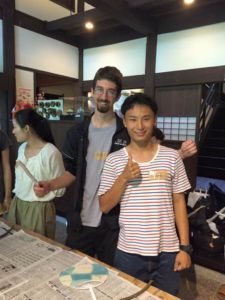Time wears on at a breakneck pace–as is always the case when dealing with workloads, social relationships, and daily adventures but nonetheless surprising for this.
I have just under a month left in Japan and the conflicted feelings are coming on strong. On one hand, I love this country and its people and its language and do not want to halt my immersion. However, I also will be happy when I finally get some time with my family back home in the U.S., country with a significant amount of issues but also that is my undeniable home.

At this point in my summer immersion experience, I find myself thinking a lot about values: what have I anticipated, what have I mistaken, what have I overlooked. Learning Japanese at an accelerated pace while also having daily interactions with native speakers and the Japanese lifestyle has been a constant process of learning things that are new while also striving to maintain the old. Perhaps one of the most difficult aspects of language immersion is that one cannot only focus on the “next chapter.” Every day may demand a varied amount of vocabulary and grammar (some learned, some not), a challenge that, slowly but surely, encourages those mental connections that turn conjugation tables and kanji lists into Japanese.

Certainly, such a challenging task of retaining the old while developing the new is most emphasized by kanji. For me, personally, kanji are a stumbling block on the path to fluency. I love kanji; I love studying such an extensive collection of symbols, each one representing not just different sounds, but concepts. For example, 花, one reading of which is はな, or hana, meaning “flower.” Sometimes, kanji form a set of sounds in a larger word, but they still retain some integral symbolism, such as 国, or くに, or kuni, “country,” which can be used in 国際的, or こくさいてき, or kokusaiteki, “international.”
So kanji are interesting and deserve my time. But they are also incredibly challenging to memorize, especially as I must constantly study new collections of them.
But while I have been struggling, I have come to find out that even native Japanese speakers can have kanji trouble.
It is a rather unique social issue: as more and more people (especially young people) are using technology for communication, kanji skills are weakening. Though I should clarify that reading kanji is not the issue, it s writing. Over the past weeks I have talked my host family, with students from the local Kanazawa Daigaku (University), and even with the summer program instructors, and all report that at one time or another they forget how to write kanji. As technology develops more and more, and tools like autofill become more fine-tuned, the need to follow stroke-orders (the, ah, “right” way to write kanji), or even to ever write by hand at all, disappears. By typing in the base syllabic components of a word (i.e. hana for 花) the kanji pops up and the brain can move on.

In the U.S., for example, it is an issue that is difficult to relate to. Once the alphabet is learned, it’s learned. People may forget words throughout their life, but not the means to express those words in writing. But in Japan, that is gradually becoming problem to investigate. As said, reading recognition is not the problem–it is writing. An issue akin to losing one’s tongue when one tries to speak, perhaps.
What learning about this issue has done is emphasize in my own mind the extreme importance of kanji acquirement and practice, especially at this early stage in my language-learning process. Kanji, was they would appear, are always going to be difficult and will always require upkeep, especially as a foreigner. Writing the same symbol several times over is nonetheless exhaustive, but maybe now I can appreciate the importance of the exercise.

Outside of kanji, a lot of my focus recently has been placed in conversation skills and vocabulary (as I have already written about, where creativity meets the need for new material). The days that I have an opportunity to speak with students from the local university are usually the accent marks to my weeks. Last weekend, I joined in with an event hosted by a university club that facilitates international interaction. We all made bread dough together and bake said dough over a fire. The experience was fun, but was made special because of one student I met in particular: he is a mechanical engineering student but, as he told me, he has a passion for English. We talked in English and Japanese together for an afternoon, each encouraging the other. Experiences like the one we shared are a demonstration of the beauty of language. We are both people who want to navigate in foreign spheres, discovering the undeniably human beneath layers of unique culture, systems, beliefs, ways of life.
Until next time.
Joshua Kuiper
カイパーヨシュア